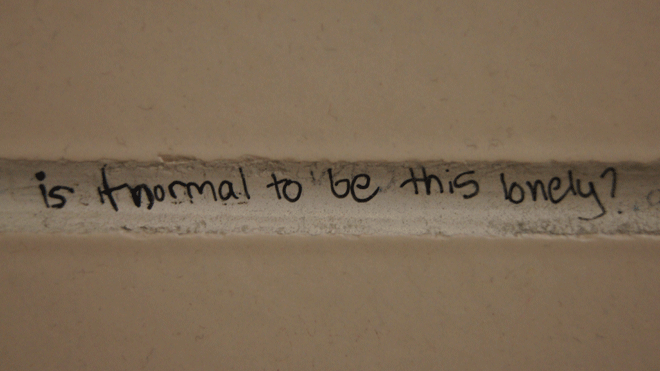
In a women’s bathroom stall in University Library, tiny words are squeezed into the cracks between the bricks of the wall.
“is it normal to be this lonely?”
”at NU, yes.”
Other conversations have taken place with the aid of the wall. People write from left to right and from top to the bottom. Some words have been there for so long that they have faded or smudged.
In these public spaces, individuals pour out the emotions and thoughts they would not necessarily share with their families or friends. Hiding your identity, it turns out, can help you embrace your identity.
"People don't feel the social pressure they would feel if they're identified," said Nicholas Merola, a Northwestern postdoctoral student who studies cognitive and social interaction in technological interactions. “You can identify yourself in a way you don't have to hide.”
Anonymity doesn’t only take the form of graffiti. Northwestern Confessions is a Facebook page where students can submit their "confessions" anonymously. The anonymous confessions in this public online space are much more negative, frequently loaded with four-letter words.
And that’s ok, according to Gary Fine, a Northwestern professor of sociology who specializes in social psychology and cultural sociology.
"Some people enjoy the hostility. It's a basis of comedy," he said. He added that for a lot of people, throwing heavy words into anonymous messages would make the confessions bolder and funnier, and attract more views.
Anonymity not only allows individuals to vent about problems they perceive in their lives or others’ – it can also crowd-source solutions to those problems.
After reading the post of one confessor who asked "is it weird to still be a virgin?" on Northwestern Confessions, Merola was inspired to conduct research on anonymity and support on NU Confessions. He and his team in Northwestern’s Social Media Lab analyzed the confessions and found that the online space is used to "find support and information, particularly on taboo topics, and to explore stigmatized identities with an audience of peers who share contextual knowledge."
That is, "Facebook confession boards" are borne out of a need for an online conversation in which dialogue – for the most part – is not connected to one's online presentation, which is often purposefully maintained and yet not fully removed from one's offline identity. Merola and his fellow researchers found that in addition to the benefits anonymity provides, confession boards also allow individuals to reach out to those not in their immediate circles.
Merola noticed beneath the Facebook post, "is it weird to still be a virgin", individuals responded via self-identified comments that they too have felt uncomfortable at times being virgins at their age, and some encouraged the anonymous person to go to CAPS or CARE for more substantial help if she or he needed it.
Merola cited Canadian sociologist Erving Goffman, who saw life as a stage and individuals as actors who performed expected roles – like losing one’s virginity – every day.
"But when we're anonymous, we don't have be on stage," Merola said.The NU Confessions post allowed students to provide support to an anonymous individual. And in the bathroom stall at University Library, another brief exchanged also showed the power of anonymity in building community.
"IT GETS BETTER"
"YOU PROMISE?"
"PROMISE"